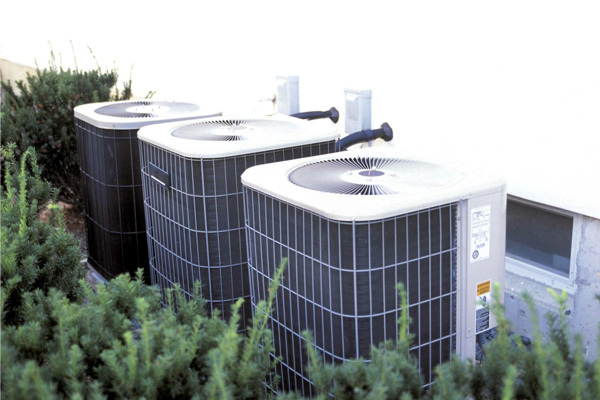
Air conditioning systems are designed to regulate indoor temperature and humidity to create a comfortable and conducive living or working environment. These systems not only provide relief from extreme weather conditions but also contribute to indoor air quality. There are primarily two types of air conditioning systems :
1. Central Air Conditioning Systems:
Central air conditioning systems are a common choice for cooling larger spaces, such as entire homes, offices, or commercial buildings. These systems consist of a central unit that cools and dehumidifies air, which is then distributed through a network of ducts and vents. The central unit typically consists of a compressor, evaporator coil, condenser coil, and a fan.
2. Split Air Conditioning Systems:
Split air conditioning systems are more suitable for cooling individual rooms or smaller areas. They consist of two main components: an indoor unit and an outdoor unit. The indoor unit includes an evaporator coil and a fan, while the outdoor unit contains a compressor and a condenser coil. These units are connected by refrigerant lines, and they work together to cool and circulate air within a specific space.
The Functioning of Air Conditioning Systems
Air conditioning systems operate on the principles of thermodynamics and refrigeration. The process involves the circulation of a refrigerant, which absorbs and releases heat to cool the air. Here's a simplified breakdown of how air conditioning systems work:
1.Evaporation: The refrigerant evaporates at a low pressure and absorbs heat from the indoor air, transforming it into a cool gas.
2.Compression: The compressor increases the pressure of the refrigerant gas, causing its temperature to rise significantly.
3.Condensation: The hot refrigerant gas releases heat as it condenses into a liquid, which is facilitated by the condenser coil located in the outdoor unit.
4.Expansion: The liquid refrigerant passes through an expansion valve, reducing its pressure and causing it to evaporate once again, starting the cycle a new.
Benefits of Air Conditioning Systems
Air conditioning systems offer a multitude of benefits that extend beyond just cooling the air. Some of these advantages include:
1.Comfort: The primary benefit of air conditioning systems is the enhanced comfort they provide, allowing us to maintain a consistent and comfortable indoor temperature regardless of external conditions.
2.Improved Indoor Air Quality: Many air conditioning systems include air filtration components that help remove dust, pollen, allergens, and even some pollutants, leading to better indoor air quality.
3.Health Benefits: Air conditioning systems can contribute to better health by reducing the risk of heat-related illnesses and improving sleep quality in cooler environments.
4.Increased Productivity: In office and commercial settings, well-regulated temperatures have been linked to higher productivity and better concentration among employees.
5.Preservation of Items: Air conditioning systems help protect sensitive materials, electronic devices, and perishable goods from heat and humidity damage.
6.Reduced Allergens: By filtering the air, these systems can reduce the presence of allergens and irritants, making indoor spaces more comfortable for individuals with allergies or respiratory conditions.
Air Conditioning System Services
To ensure the optimal performance and longevity of air conditioning systems, regular maintenance and professional services are essential. These services include:
1. Installation: Proper installation is the foundation of efficient air conditioning systems. Professionals assess the space, recommend the appropriate type and capacity of the system, and ensure correct installation to avoid operational issues.
2. Regular Maintenance: Scheduled maintenance by certified technicians helps identify and address potential problems before they escalate. This includes cleaning, lubricating moving parts, checking refrigerant levels, and ensuring proper airflow.
3. Repairs: In case of breakdowns or malfunctions, professional repair services are crucial. Attempting DIY repairs can lead to further damage and void warranties. Trained technicians diagnose issues accurately and implement effective solutions.
4. System Upgrades: As technology advances, upgrading your air conditioning system can lead to improved efficiency and performance. Professionals can guide you in selecting the most suitable upgrades based on your needs and budget.
5. Emergency Services: Some companies offer 24/7 emergency services to address sudden system failures, ensuring minimal disruption to your comfort.
Importance of Professional Services
While DIY maintenance might seem tempting, professional air conditioning services offer a range of benefits that outweigh the initial costs:
Expertise: Certified technicians have the knowledge and training to diagnose problems accurately and implement effective solutions, preventing further damage.
Safety: Air conditioning systems involve electrical components and refrigerants that can be hazardous. Professionals adhere to safety protocols to prevent accidents.
Longevity: Regular maintenance and professional care extend the lifespan of your air conditioning system, saving you money on premature replacements.
Energy Efficiency: Well-maintained systems operate more efficiently, reducing energy consumption and lowering utility bills.
Warranty Preservation: Many manufacturers require professional maintenance for warranty validity. Neglecting this could lead to voided warranties.
Air conditioning systems play a vital role in maintaining comfort, productivity, and overall well-being in our modern lives. From the different types of systems to their functioning, benefits, and the significance of professional services, Madhusuman Enterprises has explored various aspects of air conditioning. By understanding the mechanisms behind these systems and investing in regular maintenance, you can ensure that your indoor environment remains pleasant and inviting throughout the year. Remember, the key to efficient and effective air conditioning lies in a balance between your own efforts and the expertise of professionals.